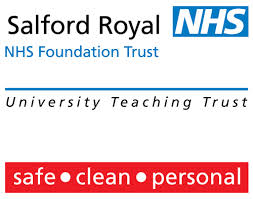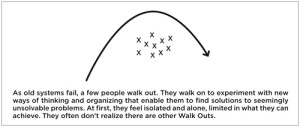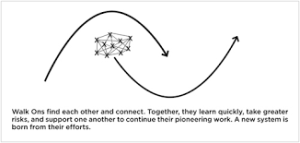Here in Morecambe Bay, we are trying to develop a strategy around Population Health – by that we mean we want to take a much broader view of the health needs of those who live in this area, ensuring that we try to tackle the disparities we see in the health of our population. In my opinion this needs a three fold approach.
Firstly, we need to get our own house in order. We know there is work

for us to do as a health system when it comes to ensuring we’re proactive with people’s health. With the resources we have available, we need to ensure that we are treating preventable conditions as well as possible and use the best evidenced-based approach to the care we are delivering. That is why, the excellent Medical Director of UHMB, Dr David Walker, with his vast experiencing in Public Health, is helping us focus on making a significant difference to preventing Strokes (CVAs – Cerebro-Vascular Accidents) across the Bay this year. We are making a concerted effort to ensure that all our patients are getting the necessary pulse checks, blood pressure checks, blood tests and appropriate medications to monitor and manage conditions which can lead to devastating consequences if left untreated or mismanaged. Within this, we are encouraging people to know more about the conditions they live with, understand them and take responsibility to ensure that they are caring for their own health.
 Secondly, we are working with people across the Bay to live more healthy lives. We continue to see more and more children running a mile a day and hope that this will soon become the Morecambe Bay Mile, in which it becomes the norm for everyone who lives here to move a mile a day. Our sedentary lifestyles are hugely affecting our health and we’re wanting to encourage all business owners and leaders to ensure that staff have time to be active every day. On top of this we’re starting to work with schools around healthy eating and involved in projects with supermarkets to enable people to make more healthy choices in the face of fierce advertising. We’re also working with high schools around mental health issues and seeing many community initiatives springing up, run by the community for the community, which will improve the wellbeing of all. All of this is backed by our ‘Flourish’ work in our hospitals and ‘Let’s Work Well’ in the community, in which NHS staff are leading by example in changing the way that we work and live.
Secondly, we are working with people across the Bay to live more healthy lives. We continue to see more and more children running a mile a day and hope that this will soon become the Morecambe Bay Mile, in which it becomes the norm for everyone who lives here to move a mile a day. Our sedentary lifestyles are hugely affecting our health and we’re wanting to encourage all business owners and leaders to ensure that staff have time to be active every day. On top of this we’re starting to work with schools around healthy eating and involved in projects with supermarkets to enable people to make more healthy choices in the face of fierce advertising. We’re also working with high schools around mental health issues and seeing many community initiatives springing up, run by the community for the community, which will improve the wellbeing of all. All of this is backed by our ‘Flourish’ work in our hospitals and ‘Let’s Work Well’ in the community, in which NHS staff are leading by example in changing the way that we work and live.
 Thirdly, however, we need to dig deeper. We keep trying to put a sticky plaster over the great pus-filled abscesses that are the leading causes of ill health in our country. Traditionally we have paid much of our attention to dealing with the symptoms of ill health, and whilst thinking about the root causes, we have simply not putting anyway near enough time, energy, or resource into tackling them. The reason for this is two fold: firstly, health and social policy is directed far too much by the political cycle and the short term gains that can proven in small time windows – so we keep tackling symptoms because we can then prove how effective we are!; secondly, in truth, we don’t actually know how to tackle some of the issues and those of us in leadership roles are far too clever and proud to admit that we don’t know how to fix them and that we need to find a new way together, with the communities of which we are a part.
Thirdly, however, we need to dig deeper. We keep trying to put a sticky plaster over the great pus-filled abscesses that are the leading causes of ill health in our country. Traditionally we have paid much of our attention to dealing with the symptoms of ill health, and whilst thinking about the root causes, we have simply not putting anyway near enough time, energy, or resource into tackling them. The reason for this is two fold: firstly, health and social policy is directed far too much by the political cycle and the short term gains that can proven in small time windows – so we keep tackling symptoms because we can then prove how effective we are!; secondly, in truth, we don’t actually know how to tackle some of the issues and those of us in leadership roles are far too clever and proud to admit that we don’t know how to fix them and that we need to find a new way together, with the communities of which we are a part.
 I was having a conversation with Cormac Russell the other day, via twitter, and he gave me this beautiful quote by Ivan Illich: “I believe it is time to state clearly that specific situations and circumstances are “sickening”, rather than that people themselves are sick. The symptoms which modern medicine attempts to treat often have little to do with the condition of our bodies; they are, rather, signals pointing to the disorders and presumptions of modern ways of working, playing and living.”
I was having a conversation with Cormac Russell the other day, via twitter, and he gave me this beautiful quote by Ivan Illich: “I believe it is time to state clearly that specific situations and circumstances are “sickening”, rather than that people themselves are sick. The symptoms which modern medicine attempts to treat often have little to do with the condition of our bodies; they are, rather, signals pointing to the disorders and presumptions of modern ways of working, playing and living.”
 The reality is that many of the determinants of our health and especially of the health inequalities we see in our society have little to do with the availability or quality of services. No, the biggest factors affecting the health gap in this (and every) area are poverty, housing, loneliness, hopelessness and adverse childhood experiences. If we’re not careful, we end up thinking the real issues are waiting times in the ED, difficulties discharging people from hospital, breaking the 18 week target for hip and knee operations and ensuring there are enough GP appointments at weekends. We must not look at the symptoms and believe that if we tackle these surface issues then we will automatically have better health outcomes for all. Here in the Bay, we are trying to be brave enough to take off the sticky plaster and gaze into the festering wounds in our society, so that we can begin to really do some deep debridement of them and allow real healing to ensue.
The reality is that many of the determinants of our health and especially of the health inequalities we see in our society have little to do with the availability or quality of services. No, the biggest factors affecting the health gap in this (and every) area are poverty, housing, loneliness, hopelessness and adverse childhood experiences. If we’re not careful, we end up thinking the real issues are waiting times in the ED, difficulties discharging people from hospital, breaking the 18 week target for hip and knee operations and ensuring there are enough GP appointments at weekends. We must not look at the symptoms and believe that if we tackle these surface issues then we will automatically have better health outcomes for all. Here in the Bay, we are trying to be brave enough to take off the sticky plaster and gaze into the festering wounds in our society, so that we can begin to really do some deep debridement of them and allow real healing to ensue.
That is why my team are focusing on hosting conversations that matter across our communities and seeking to co-create a social movement. Using the ‘Art of Hosting’ we are holding spaces open in which rich conversations can happen. “We don’t just want people to be more healthy and well – many people don’t even know what that means”, as an amazing woman called Gill, from the West End of Morecambe told us recently, “No, we want everyone to be able to experience life to the full, whatever that means for them”. We can’t do this simply by having good clinical strategies – we need something far more holistic and it will involve all of us. We need to start our conversations together with appreciative inquiry. What is already going well? What can we learn from here? Knowing what is good, however, is not enough – we must go further, dig deeper and get to grips with some extremely difficult issues.
 When it comes to Poverty, here in Morecambe Bay, we are trying out new economies (like time banking) and having challenging conversations. The Poverty Truth Commission is causing is to really listen to those with lived experience of poverty and learn to co-create and co-commission services, rather than presuming that the ‘experts’ know best.
When it comes to Poverty, here in Morecambe Bay, we are trying out new economies (like time banking) and having challenging conversations. The Poverty Truth Commission is causing is to really listen to those with lived experience of poverty and learn to co-create and co-commission services, rather than presuming that the ‘experts’ know best.
 When it comes to homelessness, inspired by the work in Alberta Canada (https://www.goodnewsnetwork.org/find-out-how-this-canadian-city-has-eliminated-homelessness/) and the Manchester Homelessness Charter (https://charter.streetsupport.net/) – we’re beginning to explore ‘housing first’ for Morecambe Bay, but imagining what it might be like with extra support in place from a caring community like ‘The Well’ in Morecambe and Barrow (https://www.thewellcommunities.co.uk/). I’m so pleased that Dave Higham is provoking this conversation for us here and I’m excited to see where a conversation between those with lived experience of homelessness, poverty and addiction, along with some of us in the public sector, might take us. There’s a challenge to all of us in society – we like the sound of these kind of things, but not in our own backyard….our values must begin to align with our actions. Love without action is not really love.
When it comes to homelessness, inspired by the work in Alberta Canada (https://www.goodnewsnetwork.org/find-out-how-this-canadian-city-has-eliminated-homelessness/) and the Manchester Homelessness Charter (https://charter.streetsupport.net/) – we’re beginning to explore ‘housing first’ for Morecambe Bay, but imagining what it might be like with extra support in place from a caring community like ‘The Well’ in Morecambe and Barrow (https://www.thewellcommunities.co.uk/). I’m so pleased that Dave Higham is provoking this conversation for us here and I’m excited to see where a conversation between those with lived experience of homelessness, poverty and addiction, along with some of us in the public sector, might take us. There’s a challenge to all of us in society – we like the sound of these kind of things, but not in our own backyard….our values must begin to align with our actions. Love without action is not really love.
 And what about loneliness and hopelessness? More than ever, we need connection across the generations, turning off our screens and actually being together as humans. In Morecambe we are seeing the launch of the new Morecambe Fringe in September, bringing people together around Comedy and the Arts. More Music are doing incredible work with young people. There are amazing community initiatives right around the Bay. We have loads of festivals connecting people across the district. And what is the role of business here? We need businesses to think abut what kind of enterprise we could see emerge for the youth in our area. Are there more opportunities for mentoring? We have left many of our young people to boredom and with few aspirations. With the help of Stanley’s Youth Centre and the great heart of Yak Patel, we hope to host many conversations with young people to really listen to what it is we could create together to break these problems and build community and hope.
And what about loneliness and hopelessness? More than ever, we need connection across the generations, turning off our screens and actually being together as humans. In Morecambe we are seeing the launch of the new Morecambe Fringe in September, bringing people together around Comedy and the Arts. More Music are doing incredible work with young people. There are amazing community initiatives right around the Bay. We have loads of festivals connecting people across the district. And what is the role of business here? We need businesses to think abut what kind of enterprise we could see emerge for the youth in our area. Are there more opportunities for mentoring? We have left many of our young people to boredom and with few aspirations. With the help of Stanley’s Youth Centre and the great heart of Yak Patel, we hope to host many conversations with young people to really listen to what it is we could create together to break these problems and build community and hope.
 What are we together going to do about the huge issue that is child abuse? We don’t have answers, but we do have questions – and we need to keep asking them. We know that the mental and physical consequences of abuse are utterly devastating and we find it hard to talk about because it affects so many of us. But our interventions are happening too little, too late, and we are missing the vast majority of cases. Our services simply cannot cope with the volume and serious case reviews tell us the same lessons nearly every time. So what? What are we going to do differently? There are definitely things that the public services can do better – but not when our resources are being stripped. What is especially terrible about the cuts to services in our most deprived areas is that ACEs cause poverty, homelessness, isolation and ill health! As a team, we take this really seriously and will be hosting discussions in our schools and local communities about how we raise happy, healthy children. Where is help needed? We’ve become so focused on grades and outcomes in schools…..but do we teach people what to do with their anger? Do we focus enough on values? Are there enough parenting (the hardest job in the world) classes – and if so, are they hitting the mark? What do we need to do differently? We know the situations in which children are more likely to suffer – so what? Have we become so focused on getting people into work that we’ve forgotten just how important parenting is? And if we know that ACE is such a massive issue, are we really making the right choices in terms of what therapies we’re making available for those who have suffered them?
What are we together going to do about the huge issue that is child abuse? We don’t have answers, but we do have questions – and we need to keep asking them. We know that the mental and physical consequences of abuse are utterly devastating and we find it hard to talk about because it affects so many of us. But our interventions are happening too little, too late, and we are missing the vast majority of cases. Our services simply cannot cope with the volume and serious case reviews tell us the same lessons nearly every time. So what? What are we going to do differently? There are definitely things that the public services can do better – but not when our resources are being stripped. What is especially terrible about the cuts to services in our most deprived areas is that ACEs cause poverty, homelessness, isolation and ill health! As a team, we take this really seriously and will be hosting discussions in our schools and local communities about how we raise happy, healthy children. Where is help needed? We’ve become so focused on grades and outcomes in schools…..but do we teach people what to do with their anger? Do we focus enough on values? Are there enough parenting (the hardest job in the world) classes – and if so, are they hitting the mark? What do we need to do differently? We know the situations in which children are more likely to suffer – so what? Have we become so focused on getting people into work that we’ve forgotten just how important parenting is? And if we know that ACE is such a massive issue, are we really making the right choices in terms of what therapies we’re making available for those who have suffered them?
Is it the role of those of us in healthcare to get involved in these discussions? YES! It is the role of all of us in society. Together, we must reimagine the future. We all know that prevention is better than cure, but our short-termism is stopping us from finding the kind of positive solutions that will really make a difference. In face of downward pressure from hierarchical powers, it is tough to make brave decisions to invest in the future, rather than cut our way to balancing the books. But if we really care about the health and wellbeing of our communities, then we have to stop the sticking plaster approach and clean out the gangrenous wounds in our society. We have to deal with the root and not the fruit.
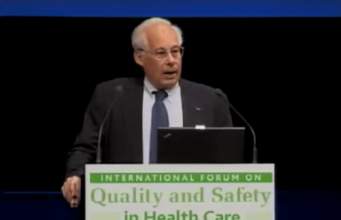
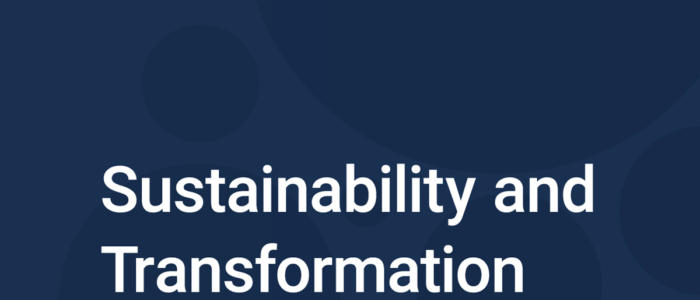
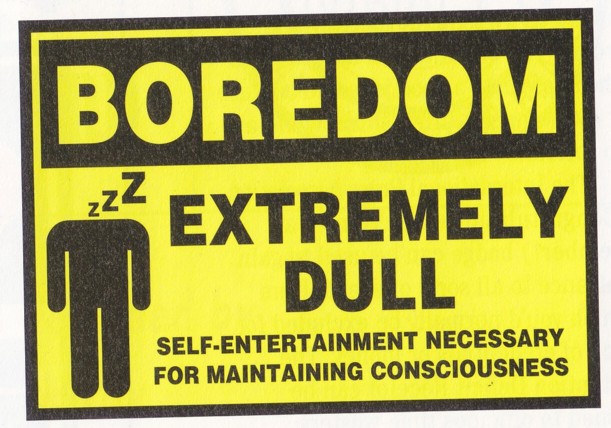 I’m not a great meetings person. I just generally find them tedious. I lose concentration easily, I get distracted, I end up thinking about a whole lot of things that maybe I shouldn’t be thinking about or eat far too many biscuits and then feel bloated and guilty at the same time! Meetings and me don’t really mix….but I have to go to a lot of them, in fact, I now have to chair many of them and so I’ve been on a bit of a journey about how meetings can be made better.
I’m not a great meetings person. I just generally find them tedious. I lose concentration easily, I get distracted, I end up thinking about a whole lot of things that maybe I shouldn’t be thinking about or eat far too many biscuits and then feel bloated and guilty at the same time! Meetings and me don’t really mix….but I have to go to a lot of them, in fact, I now have to chair many of them and so I’ve been on a bit of a journey about how meetings can be made better. is not that they don’t achieve anything. Nor is it that I’m involved in conversations I don’t care about – actually I don’t go to any meetings in which I don’t deeply care about the things being discussed. So what is my problem? My problem is that meetings, and I don’t think this is unique to the NHS (but this is where most of my meetings take place), are so often devoid of any real human connection. They lack care for those attending the meetings. It’s so easy to get so focussed on the stuff, the business, the discussions, the problems, that we forget that there are other human beings in the room, each of whom arrive in the room (or virtual space) with many different emotions, stories, dreams and realities that may be really important, but we don’t know because we don’t give space to those things.
is not that they don’t achieve anything. Nor is it that I’m involved in conversations I don’t care about – actually I don’t go to any meetings in which I don’t deeply care about the things being discussed. So what is my problem? My problem is that meetings, and I don’t think this is unique to the NHS (but this is where most of my meetings take place), are so often devoid of any real human connection. They lack care for those attending the meetings. It’s so easy to get so focussed on the stuff, the business, the discussions, the problems, that we forget that there are other human beings in the room, each of whom arrive in the room (or virtual space) with many different emotions, stories, dreams and realities that may be really important, but we don’t know because we don’t give space to those things. a simple technique from the ‘art of hosting’ I give space for a ‘check-in’. A check in is really simple, it’s just what it says on the tin. There are usually 2 questions and they can vary from meeting to meeting. Often, I just ask: How are you? And what do you love about your job? It is so important to know how each other is doing, so we can create teams that care for each other. People don’t have to be honest, but when they choose to be vulnerable, it opens up a space that is incredible and invites the entire team to go a bit deeper. And giving space for people to focus on the positive aspects of their work automatically changes the dynamic of any meeting from the start. Another of my favourite questions is: What do you love about working with the person on your left? (And if there’s time another round of ‘And what else do you love about working with the person on your left?). It is so healthy for a team to learn to appreciate one another but more than that, to actually tell each other that they are valued. You can get to know one another over a period of just a few weeks so much more and you end up actually caring about one another’s lives and wellbeing.
a simple technique from the ‘art of hosting’ I give space for a ‘check-in’. A check in is really simple, it’s just what it says on the tin. There are usually 2 questions and they can vary from meeting to meeting. Often, I just ask: How are you? And what do you love about your job? It is so important to know how each other is doing, so we can create teams that care for each other. People don’t have to be honest, but when they choose to be vulnerable, it opens up a space that is incredible and invites the entire team to go a bit deeper. And giving space for people to focus on the positive aspects of their work automatically changes the dynamic of any meeting from the start. Another of my favourite questions is: What do you love about working with the person on your left? (And if there’s time another round of ‘And what else do you love about working with the person on your left?). It is so healthy for a team to learn to appreciate one another but more than that, to actually tell each other that they are valued. You can get to know one another over a period of just a few weeks so much more and you end up actually caring about one another’s lives and wellbeing.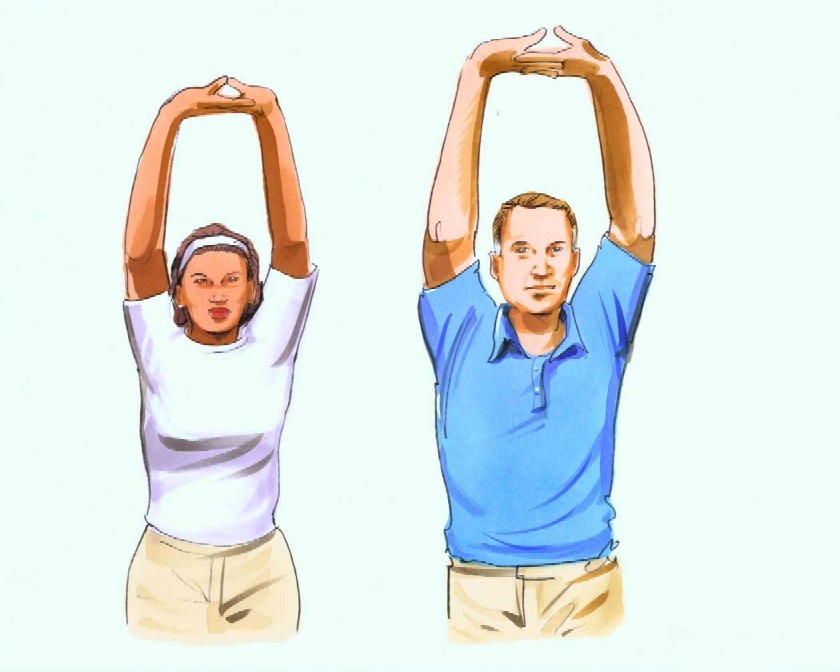 University of East London. In the department of positive psychology there, a bell goes every 25 minutes of a lecture and everybody stands up and has a stretch. Research clearly shows, we don’t concentrate for any more than 25 minutes. And so now, in my meetings, every 25 minutes, my alarm goes off and we all stand up and stretch and get the blood flowing round our bodies. We’ve become so conditioned, like Pavlov’s dogs, that if anyone’s phone goes we all start to stand and stretch! Plus, it is great for low back pain!
University of East London. In the department of positive psychology there, a bell goes every 25 minutes of a lecture and everybody stands up and has a stretch. Research clearly shows, we don’t concentrate for any more than 25 minutes. And so now, in my meetings, every 25 minutes, my alarm goes off and we all stand up and stretch and get the blood flowing round our bodies. We’ve become so conditioned, like Pavlov’s dogs, that if anyone’s phone goes we all start to stand and stretch! Plus, it is great for low back pain!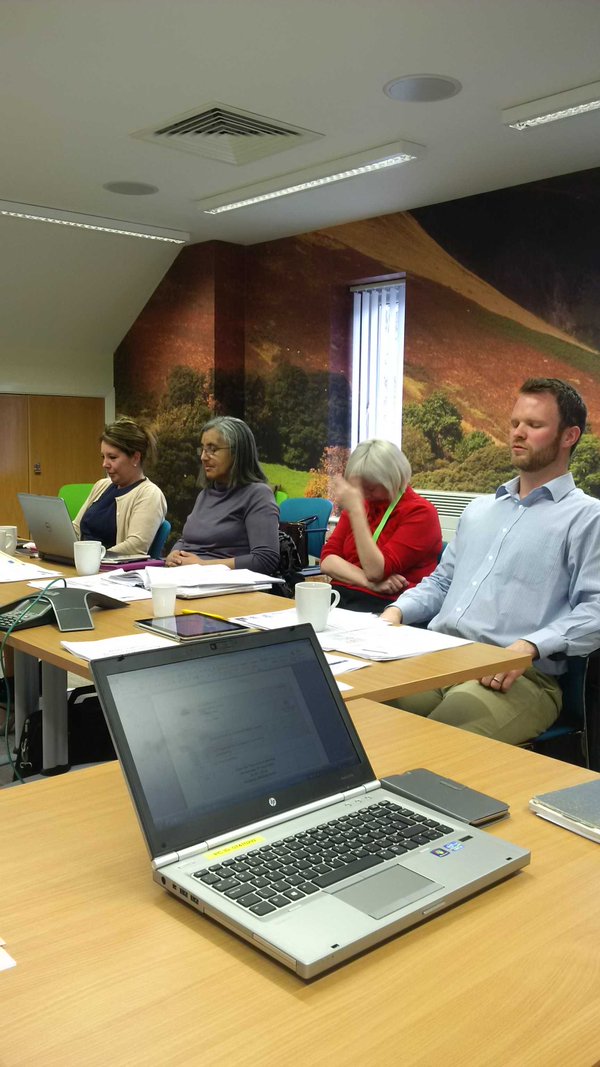 in the middle of a meeting. Using a very simple technique, I encourage everyone to find a comfortable sitting position. We then breathe in through our noses for the count of 4, deliberately breathing a sense of hope, peace, love and gratitude. We then hold this and hold our breath for the count of 8 (people count at their own pace) and then breathe out to through our mouths for the count of 8. When we breathe out, we deliberately breathe out stress, bitterness, anger, distraction, or anything that stops us being able to connect. And then we continue. The first few times I tried this, we had some giggling (mainly from me), photos being posted on twitter (!) and general weird feelings…..but we have pushed through and it’s amazing how good it feels to just stop and be and let the busyness just wash over us for a couple of minutes.
in the middle of a meeting. Using a very simple technique, I encourage everyone to find a comfortable sitting position. We then breathe in through our noses for the count of 4, deliberately breathing a sense of hope, peace, love and gratitude. We then hold this and hold our breath for the count of 8 (people count at their own pace) and then breathe out to through our mouths for the count of 8. When we breathe out, we deliberately breathe out stress, bitterness, anger, distraction, or anything that stops us being able to connect. And then we continue. The first few times I tried this, we had some giggling (mainly from me), photos being posted on twitter (!) and general weird feelings…..but we have pushed through and it’s amazing how good it feels to just stop and be and let the busyness just wash over us for a couple of minutes.

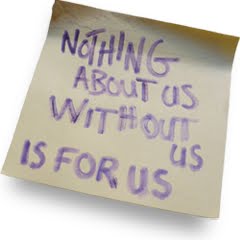
 een willing to be humble and be impacted by these stories. I am grateful for relationships and partnerships that are being established between those of us who provide services and those who use them. I am grateful for the tenacity of people who want to see our cultures change. I am grateful for ‘The Leeds Poverty Truth Challenge’ and its far reaching consequences. I am grateful for the opportunity to break down barriers and find positive ways forward. I am grateful for the transformative power of listening and the change that can happen when we really encounter another human being. Better Care Together is so much better when we work together with those we are trying to serve.
een willing to be humble and be impacted by these stories. I am grateful for relationships and partnerships that are being established between those of us who provide services and those who use them. I am grateful for the tenacity of people who want to see our cultures change. I am grateful for ‘The Leeds Poverty Truth Challenge’ and its far reaching consequences. I am grateful for the opportunity to break down barriers and find positive ways forward. I am grateful for the transformative power of listening and the change that can happen when we really encounter another human being. Better Care Together is so much better when we work together with those we are trying to serve.

